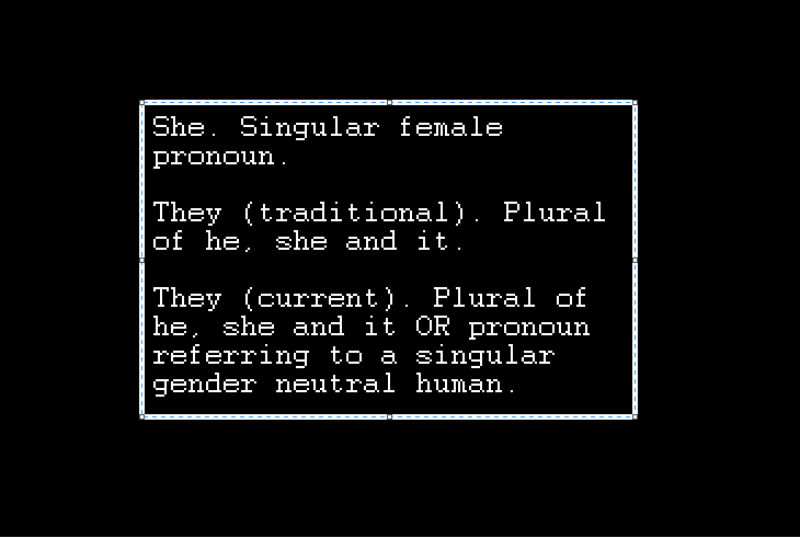The pronoun change that distorted my perceived sexuality.
Ever since I learnt about building schemas during my university career I have literally felt and seen myself adapt my schemas around new information in regards to Dylan's transition to gender neutral. As I've found out about each new change I have sat with the discomfort of the unknown before then adapting my schema to reflect the new information and fit it into my reality. A part of me has marvelled at my ability to adapt as I've watched my brain 'come around' to the new ideas and accept them as the new normal, whilst another part has actively pulled away and resisted these changes due to fear of losing myself in the process. For me one of the hardest transitions to come to terms with has been the pronoun change which is actually still very new as I write this, and as yet not put into practice by anyone except me.
Dylan told me recently that they planned to change their pronoun from she to they, something that I suspected was coming but if I'm honest really hoped wouldn't. For Dylan this change was something that made them feel more like themselves, and better reflected the way the gender binary did not suit them she and he simply did not reflect Dylan's identity. For me, however, it is through this one word change, from she to they, that I feel the public loss of my identity most keenly.
In using they when referencing my partner a large part of my identity, the lesbian part, is no longer readily obvious. Where previously I could gently 'out' myself through a comment such as 'My partner is a brilliant social worker, she works for…', I am now faced with the comment 'My partner is a brilliant social worker, they work for…', which I fear will be read as me trying to hide the gender of my partner, rather than as my partner being gender neutral since this gender is not yet part of mainstream consciousness. This then implies that I am uncomfortable in my sexuality and greatly saddens me because I am actually very confident and happy in my sexuality, so to come across as uncomfortable makes me, well, uncomfortable! I mentioned this to an Austrian friend this morning and she actually said that as an ESL (English as a second language) person she would read this as me having multiple partners, something else I hadn't considered, but also inaccurate in my case.
In order to avoid this confusion I need to preface every conversation with an explanation of my partner's gender, something that is at times a little daunting considering that they are part of a considerably small minority group (and we all know that discrimination comes readily when society lacks understanding), as well as a direct explanation of my sexuality if I want to share that part of my identity. No more subtle, gentle outings for me- blunt explanations only.
In this way I have come to realise that the hardest part of this particular change is that this is not going to be a transition from one thing to another and then it is completed. Unlike Dylan's name change, which was a transition for our current community but is irrelevant in all new social situations, this pronoun change is going to be a lifelong process, and one that requires me to regularly explain. Any person that I ever talk to about my partner will need a direct explanation of both of us if I want them to understand my identity. In terms of my sexuality this is quite different from the simplistic and subtle outing that I have become used to over the last 10 years.
Through this I've really realised just how much sexuality is a key part of identity and is often seen as reflected in choice of partner. The problem that I'm now having, though, is that my sexuality is seemingly at odds with Dylan's gender; if I am she and Dylan is they then what sexuality am I, and what type of relationship are we in? The use of pronouns, something seemingly so simple, distorts my sexuality and makes it unrecognisable. My place in society is no longer easily readable through conversation, but shrouded in mystery. Am I uncomfortable with my sexuality? Dating many people? Don't know that 'they' is (traditionally) a plural?
Whilst this has been a big change for me, I can feel my schema adapting to our new reality and building new pathways to reconcile the new ways that my identity will need to be expressed. I am still daunted and worried but I can also feel a small yet distinct flutter of excitement at the prospect of pioneering social change through sharing mine and Dylan's confidence in our genders and sexualities. I am learning how to make my language reflect our identities and new ways to feel comfortable 'outing' us. I am learning to truly own my identity, both as an individual entity and as a reflection of Dylan. Yes, I am the partner of a gender neutral person, but I am also my own person with my own identity words. I am a lesbian, who happens to be in love with a human that lives slightly out of the box, and has 'character' rather than 'gendered traits'. I am the 'she' in she+they- and that means whatever I want it to mean, not what society stipulates.
Emma is a musician and teacher with a passion for travelling, writing and nature. She recently combined these passions and started a blog about being the partner of a gender neutral person whilst she was travelling solo through South America. To find out more about Emma, gender neutrality and what it means to be the partner of a gender neutral person check out her new blog.
